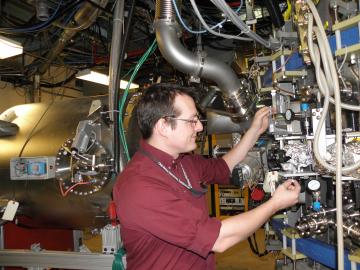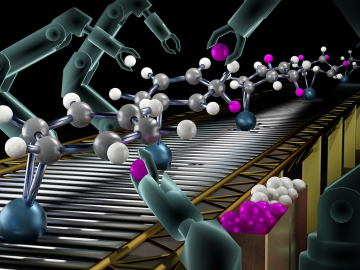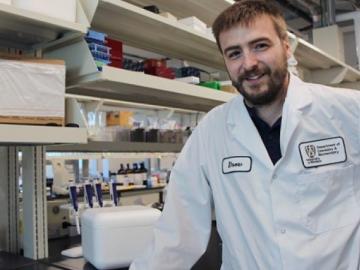
Filter News
Area of Research
- Advanced Manufacturing (3)
- Biology and Environment (15)
- Computational Biology (1)
- Computational Engineering (1)
- Computer Science (2)
- Electricity and Smart Grid (2)
- Energy Science (47)
- Fusion and Fission (19)
- Fusion Energy (13)
- Isotopes (19)
- Materials (43)
- Materials for Computing (3)
- Mathematics (1)
- National Security (15)
- Neutron Science (78)
- Nuclear Science and Technology (20)
- Nuclear Systems Modeling, Simulation and Validation (1)
- Quantum information Science (1)
- Sensors and Controls (1)
- Supercomputing (18)
News Type
News Topics
- (-) Advanced Reactors (25)
- (-) Clean Water (30)
- (-) Critical Materials (17)
- (-) Cybersecurity (17)
- (-) Fusion (47)
- (-) Grid (54)
- (-) Isotopes (38)
- (-) Neutron Science (109)
- (-) Physics (38)
- 3-D Printing/Advanced Manufacturing (89)
- Artificial Intelligence (92)
- Big Data (62)
- Bioenergy (84)
- Biology (100)
- Biomedical (53)
- Biotechnology (28)
- Buildings (50)
- Chemical Sciences (48)
- Composites (21)
- Computer Science (153)
- Coronavirus (30)
- Education (2)
- Emergency (4)
- Energy Storage (64)
- Environment (164)
- Exascale Computing (52)
- Fossil Energy (7)
- Frontier (45)
- High-Performance Computing (93)
- Hydropower (12)
- Irradiation (2)
- ITER (7)
- Machine Learning (51)
- Materials (87)
- Materials Science (89)
- Mathematics (11)
- Mercury (10)
- Microelectronics (3)
- Microscopy (34)
- Molten Salt (7)
- Nanotechnology (29)
- National Security (63)
- Nuclear Energy (85)
- Partnerships (37)
- Polymers (18)
- Quantum Computing (39)
- Quantum Science (59)
- Security (17)
- Simulation (51)
- Software (1)
- Space Exploration (23)
- Statistics (3)
- Summit (48)
- Transportation (66)
Media Contacts

ORNL researchers have developed an intelligent power electronic inverter platform that can connect locally sited energy resources such as solar panels, energy storage and electric vehicles and smoothly interact with the utility power grid.

Lithium, the silvery metal that powers smart phones and helps treat bipolar disorders, could also play a significant role in the worldwide effort to harvest on Earth the safe, clean and virtually limitless fusion energy that powers the sun and stars.

From materials science and earth system modeling to quantum information science and cybersecurity, experts in many fields run simulations and conduct experiments to collect the abundance of data necessary for scientific progress.

In the search to create materials that can withstand extreme radiation, Yanwen Zhang, a researcher at the Department of Energy’s Oak Ridge National Laboratory, says that materials scientists must think outside the box.

Temperatures hotter than the center of the sun. Magnetic fields hundreds of thousands of times stronger than the earth’s. Neutrons energetic enough to change the structure of a material entirely.

Scientists have found a new method to strategically add deuterium to benzene, an aromatic compound commonly found in crude oil. When applied to the active ingredient of drugs to incorporate deuterium, it could dramatically improve the drugs’ efficacy and safety and even introduce new medicines.

ITER, the world’s largest international scientific collaboration, is beginning assembly of the fusion reactor tokamak that will include 12 different essential hardware systems provided by US ITER, which is managed by Oak Ridge National Laboratory.

Oak Ridge National Laboratory researchers have discovered a better way to separate actinium-227, a rare isotope essential for an FDA-approved cancer treatment.

Does vaping and smoking e-cigarettes put you at higher risk of COVID-19 complications? UWindsor’s Drew Marquardt is trying to answer that question with research into how the toxicants in the oils of vapes and e-cigarettes affect lung function.

Scientists at the Department of Energy Manufacturing Demonstration Facility at ORNL have their eyes on the prize: the Transformational Challenge Reactor, or TCR, a microreactor built using 3D printing and other new approaches that will be up and running by 2023.


